Charlotte Worthington Upsets Hannah Roberts to Win Gold in the Women’s BMX Freestyle Final
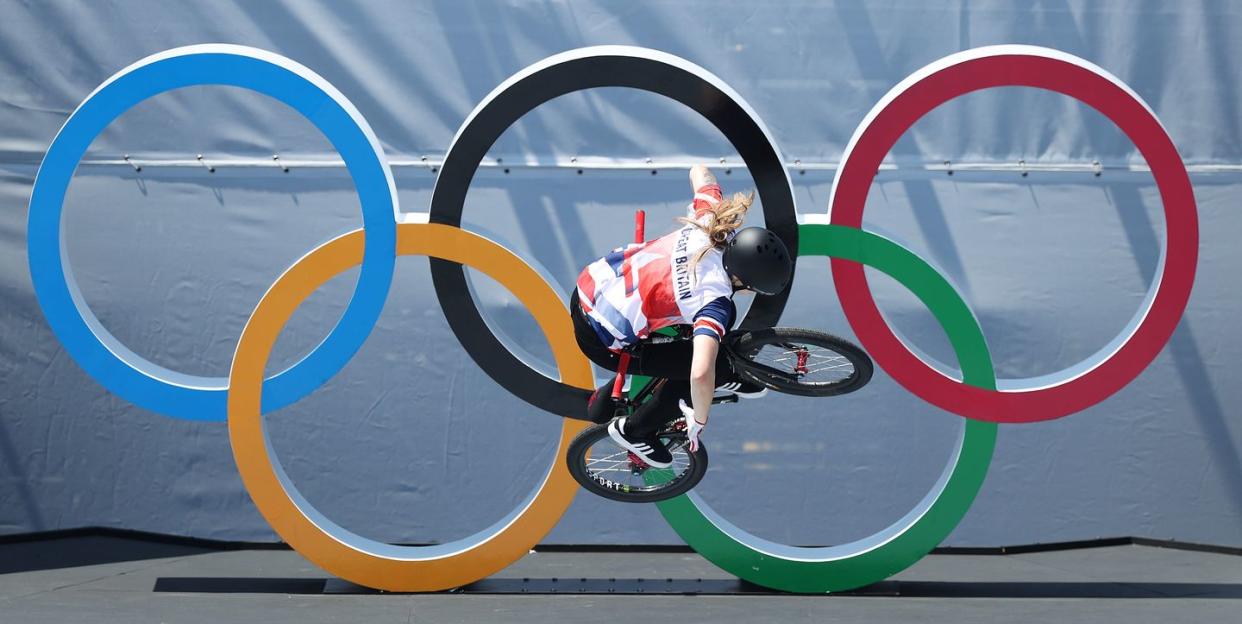
The Tokyo Olympics officially kicked off with the Opening Ceremony on July 23, and now cycling fans have 16 days of competition to look forward to.
Who said anything about withdrawal from the Tour de France?
There are five cycling disciplines—Road race, mountain bike, BMX racing, BMX freestyle, and track cycling—and 22 events among those five disciplines. A medal will be handed out each day from July 24 until August 8, with the exception of July 29. So consider that your rest day!
Below, we recap each medal event, and any highlights that you need to know about from the qualifying rounds.
→ Sign up for Bicycling All Access for the latest cycling news, fitness tips, and fresh gear reviews 🚲
Complete Olympic schedule | How to watch cycling at the Olympics
Women’s and men’s BMX freestyle final—August 1
In the first-ever Olympic BMX freestyle final, riders had two attempts to put up their best run, and unlike the preliminaries, only the score from the best run would count for the medal.
In both the men's field and women's field, we saw more crashes than the semi-finals: As riders battled for Olympic medals, the tricks were bigger and the stakes were higher. Here's how it went down:
There were big attempts and big crashes in the first set of runs in the women’s competition. Great Britain’s Charlotte Worthington went for a backflip right at the start, following it with a backflip 360 attempt, and came so close to landing it before crashing in the first 15 seconds of the round.
American Hannah Roberts finished a triumphant first run, featuring two backflips and a double tail whip. It was so good that she emotionally tossed her bike to the ground—and her score? A whopping 96.1, nearly ensuring her gold medal.
In the second round, though, Worthington opted to make a second attempt at her original run, and nailed the backflip-360 and a front flip. The amazing performance—with the world’s first backflip 360 for women in competition—was good for a huge 97.5.
In her final run, Roberts attempted a double tailwhip that caused a bobble, and she rolled out of the park smiling, secure with her silver medal. Switzerland’s Nikita Ducarroz’s first run was good for a bronze medal, and American Perris Benegas finished in fourth.
In the men’s field, Great Britain's Declan Brooks pulled off a double backflip—a move that knocked him out at the world championships just weeks prior—and had a fantastic first run. Costa Rica's Kenneth Tencio, Australia's Logan Martin, and Venezuela's Daniel Dhers also had great opening runs. Many of the rides in the opening were marred by small crashes and bobbles, though no major crashes.
Martin took gold with a huge first performance packed with front flips and multiple tailwhips, good for a 93.3, and he was able to enjoy a 'victory lap' second run having already secured the gold. Dhers took silver with a 92.05, and Brooks’s second run was good for bronze with a 90.8.
American Nick Bruce was the first rider up, but his hurt shoulder prevented him from putting together a strong run (he didn’t take the start for his second attempt). Fellow American Justin Dowell also suffered from some crashes in both runs and would finish low in the standings.
Women’s and men’s BMX freestyle seeding—July 31
There were few surprises in the BMX freestyle preliminary event—the first-ever at the Olympics. The nine men and nine women each completed two one-minute runs to determine starting order for tomorrow’s final event.
World champion Hannah Roberts from the United States handily secured the top spot, averaging 87.7 out of 100 after her two runs. She will be the last to do her run in the final. Behind her, American Perris Benegas, Switzerland’s Nikita Ducarroz, and Great Britain’s Charlotte Worthington also ranked in the 80s.
In the men’s field, Logan Martin of Australia had the top scores on both runs, finishing with a 90.97 on average. Behind him, Rim Nakamura of Japan, Daniel Dhers of Venezuela, Anthony Jeanjean of France, and Irek Rizaev of the Russian Olympic Committee all scored over 80 in their two-run average.
American Nick Bruce surprised the crowds when he did two runs with no tricks at all. That earned him a 3.8 score, which leaves him in last place—first to start in the final tomorrow. He later took to Instagram to explain that a crash earlier in the week has left him unsure if he’ll be able to compete, though he’s hoping to try tomorrow.
“Absolutely bummed, I had a really bad crash a few days ago in practice. Haven’t been able to ride since, thankfully everyone in sports med is doing a lot to try and get me ready for tomorrow,” he wrote. “Today in seeding I had to keep it easy to keep the shoulder fresh so hopefully tomorrow the strength comes back and I can put down a run!”
Another injury update: BMX racer Connor Fields is out of the ICU after a brutal crash during Friday’s semifinals. CNN reported that he suffered from broken ribs, a bruised lung, and—most worrisome—a brain hemorrhage, but he’s stabilized and his father reports that he’s cognitively doing well.
Women’s and men’s BMX racing semifinals and final—July 30
Women
🥇 Bethany Shriever, Great Britain
🥈 Mariana Pajon, Colombia
🥉 Merel Smulders, the Netherlands
Men
🥇 Niek Kiemmen, the Netherlands
🥈 Kye Whyte, Great Britain
🥉 Carlos Alberto Ramirez Yepes, Colombia
The semifinal and final Olympic BMX races seemed particularly unlucky for riders: Weather caused the races to be delayed, and several large crashes in the semifinals shook up the selection for the final. At the end of the day, the Netherlands’s Niek Kimmann and Great Britain’s Bethany Shriever took home the gold medals.
Similar to the quarterfinals, the semifinals were determined by three runs—two women’s fields and two men’s fields of eight racers each, with only the top four in each field moving on to the final. The final races immediately afterward, so there’s a certain amount of strategy involved in the semifinals as riders try to stay at the top of the field to qualify, without expending too much energy while also avoiding crashes.
In the women’s field, defending gold medalist Mariana Pajon of Colombia and American Felicia Stancil handily moved on to the finals, along with Great Britain’s Bethany Shriever, Australia’s Laura Reynolds, and France’s Axelle Etienne.
American Alise Willoughby crashed in two of the three semifinal heats, leaving her out of the final race. Australian Saya Sakakibara also crashed badly in the last heat of the semifinals, which required her to be transported off of the course on a stretcher.
In the men’s semifinals, Frenchmen Sylvain Andre and Joris Daudet, along with the Netherlands’s Niek Kimmann cemented their positions in the final. In the last heat, American Connor Fields, the defending gold medalist, crashed hard and was carried off the course on a stretcher and taken to a hospital in Tokyo. In a statement, USA BMX said, “We can confirm that Connor Fields is awake, stable, and awaiting further medical evaluation. He will remain in the hospital under observation.”
In the single round of racing for the Olympic finals, Kimmann took early control and led almost from the start for a dominant win. Great Britain’s Kye Whyte following close behind to finish in silver, and Colombia’s Carlos Alberto Ramirez Yepes took bronze. There was only one crash in the final, with Daudet taking a spill in a corner.
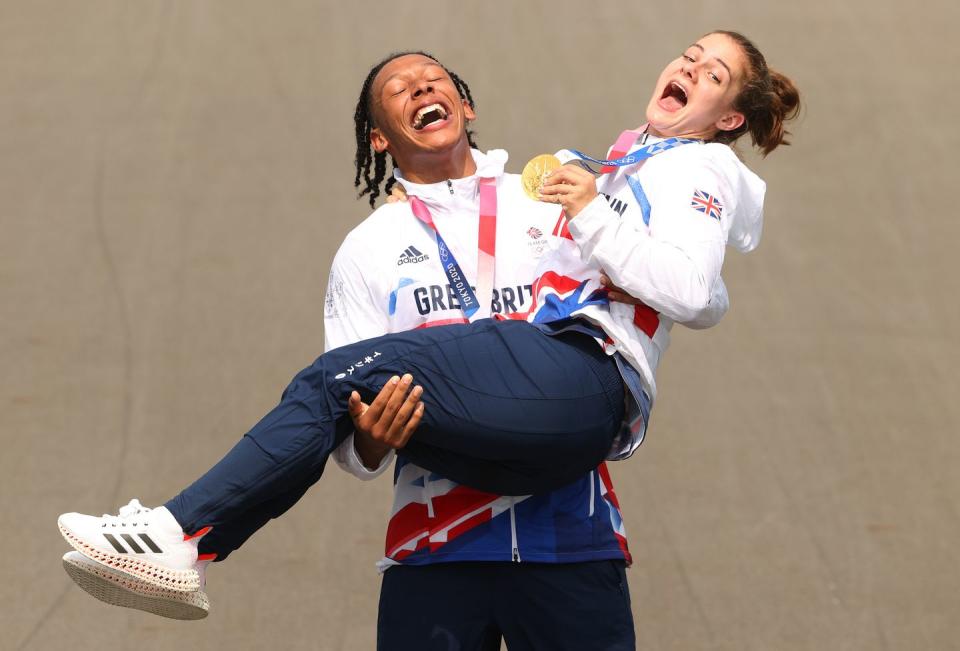
In the women’s final, Shriever led coming into the first berm, and Pajon chased heading into the second berm with Merel Smulders behind her. As they came into the final straight, Shriever took the win in front of Pajon by a wheel length.
It was an emotional finish for Shriever, who was immediately picked up in a victory salute by Whyte. The first words we heard from her in the feed? “I need to sit down.” (She also may be one of the first racers to both happily shout and huff ‘fuck’ on the finish line after the semifinals and the final.)
Women’s and men’s BMX racing quarterfinals—July 29
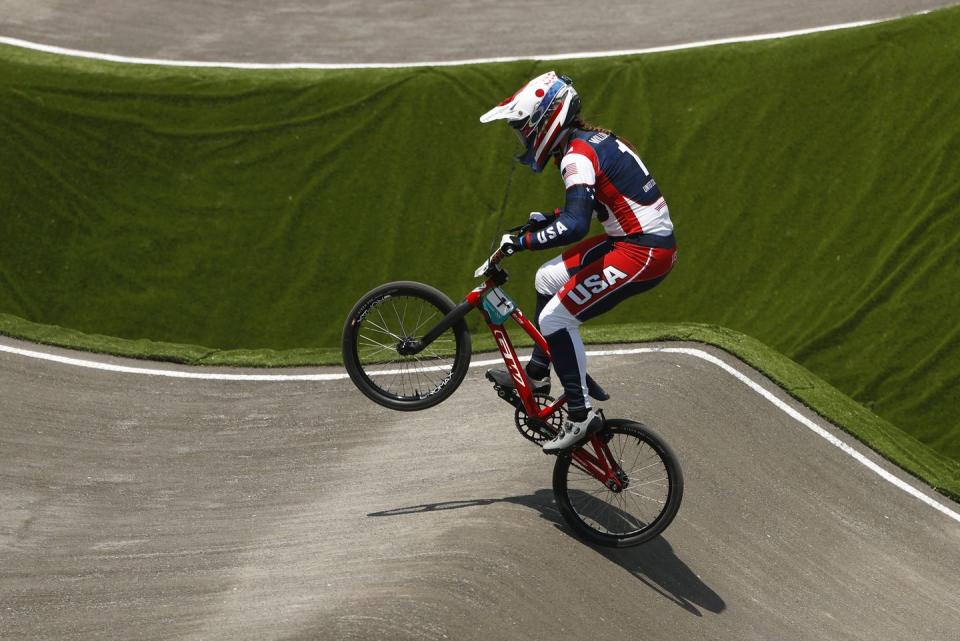
The men’s and women’s BMX quarterfinals, held at the Ariake Urban Sport Park, brought few surprises, with all of the top racers making it into tomorrow’s semifinals. The quarterfinals featured four heats with six riders in each. They race three runs, and the top four finishers in each group moved on.
In the women’s race, two-time Olympic gold medalist Mariana Pajón of Colombia and Alise Willoughby of the United States both won all three of their runs. Laura Smulders of Switzerland won two and scored second in the third, and Bethany Shriever of Great Britain won her first two runs and was third in the third run. Felicia Stancil of the United States won her first run and was second in runs two and three.
The men’s race had its share of controversy before the race even started, as Dutch racer Twan van Gendt announced that he would be using two gears on his BMX bike, taking advantage of a lesser known UCI rule that allows for multiple gears on a BMX bike. The ability to start in a harder gear and then shift into an easier one after the explosive start can be game-changing.
In the men’s race, Frenchmen Sylvain Andre and Joris Daudet both won all three of their runs in their respective heats. Niek Kimmann of the Netherlands beat countryman van Gendt in all but one run, and American Connor Fields—also an Olympic champion—won two of the three runs.
Despite several crashes for in both the men’s and women’s fields, only one rider, Japan’s Sae Hatakeyama, was unable to continue on after hitting the ground hard early in the first run and breaking her collarbone.
Even if you don’t typically watch BMX racing, the semifinals and finals will be worth tuning into—the races last less than 45 seconds but are wildly fun to watch.
Women’s and men’s individual time trial—July 28
Women
🥇 Annemiek van Vleuten, the Netherlands
🥈 Marlen Reusser, Switzerland
🥉 Anna van der Breggen, the Netherlands
Men
🥇 Primož Roglič, Slovenia
🥈 Tom Dumoulin, the Netherlands
🥉 Rohan Dennis, Australia
The Netherlands’s Annemiek van Vleuten rode her way to the fastest time of the day in the women’s racing, finishing the 22.1km course in 30:30.49. In the men’s race—two laps of the same course—Slovenia’s Primož Roglič was the victor with a time of 55:04.19.
The course featured two longer climbs of nearly five percent gradient in the 13.7 mile circuit. While the first kilometer had some tight turns and twists, much of it was relatively non-technical. Still, riders faced strong winds and a drizzling rain as they pedaled away. And the slight uphill into the finish had some riders making the decision to swap from time trial position on the aero bars to sprinting with their hands on the outer bars.
Women’s ITT was a redemption race for the Dutch
For van Vleuten, this race was a chance to redeem herself after her accidental celebration at the finish of the women’s road race, when she thought she had won the gold medal, but had in fact, gotten silver. The look on her face during the time trial revealed that she was going to do everything she could to get the gold, and she delivered an amazing performance.
Switzerland’s Marlen Reusser had the second-fastest time of the day, 56 seconds behind Van Vleuten. And as Anna van der Breggen of the Netherlands came in with a time that was good for the bronze, van Vleuten was finally able to actually celebrate the gold medal. (The relief on her face was palpable.)
The U.S.’s Amber Neben, 46, was the top American and posted one of the fastest times of the day in 31:26, good for fifth place. Fellow American and medal hopeful Chloe Dygert started second-to-last, but clearly had an issue during her race and finished much lower in the standings than anticipated. She still squeaked out a seventh place, though. (Dygert is also racing on the track, so look for her next week.)
Roglič dominates the men’s race
Slovenian Primož Roglič finished the two laps of the ITT course in 55:04.19. He was followed by Dutch racer Tom Dumoulin, just over a minute behind, and Australian Rohan Dennis just two seconds behind him. Behind them, Dutch rider Stefan Küng was under a second out of medal contention, with Italian Filippo Ganna only a second behind him.
American riders Brandon McNulty and Lawson Craddock finished 24th and 34th, respectively.
Roglič, who was the seventh-from-last to start, certainly had a good reason to push for the gold as a redemption race. His Tour de France was marred by early crashes—two serious ones in the early stages—and he was eventually forced to abandon the race to heal from his crashes and shift focus to the Olympics. Clearly, he made the right decision.
Dumoulin was also down in the 10th start position, and even he wasn’t able to come anywhere close to Jumbo-Visma teammate Roglič’s time.
The primary drama in the men’s race came from the sidelines: the German time trial coach was heard on camera shouting, “Get the camel drivers” to the German riders, referring to the Algerian and Eritrean cyclists ahead. He has since apologized for his remarks.
Women’s mountain bike cross-country race—July 27
🥇 Jolanda Neff, Switzerland
🥈 Sina Frei, Switzerland
🥉 Linda Indergand, Switzerland
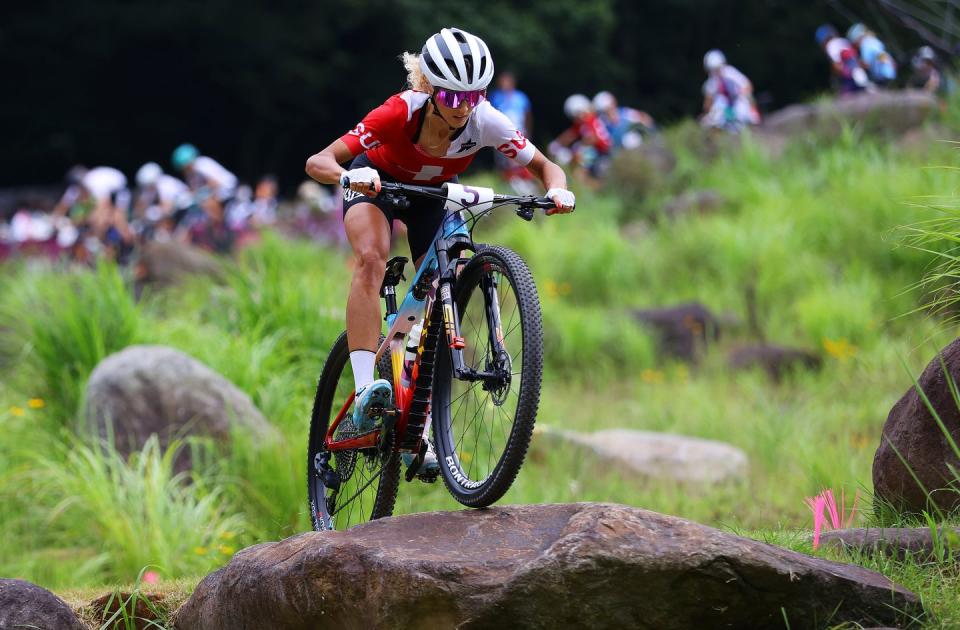
The women’s mountain bike race saw an astounding Swiss sweep of the podium, with Jolanda Neff, Sina Frei, and Linda Indergand taking the gold, silver, and bronze, respectively.
French riders Loana LeComte and Pauline Ferrand-Prévot were among the favorites to win this race, on a hot day featuring a muddy course, which made for a slick ride that favored technical racers. LeComte started hard, but Austria’s Laura Stigger was the first woman through the start loop. The two were closely followed by Neff and Ferrand-Prévot who were working to keep Lecomte from riding away with the races, as she’s done all season at the World Cups.
As Neff and Ferrand-Prévot hit a small rock climb, Ferrand-Prévot’s wheel slid, and she tipped over, causing her bike to skid back down the hill. Ferrand-Prévot was then passed by LeComte, Indergand, Frei, The Netherlands’s Anna Terpstra, and Great Britain’s Evie Richards, as Ferrand-Prévot was relegated back to sixth.
Neff quickly grew a gap up to 19 seconds by the end of lap one, and Richards continued to lead the chase. Indergand and Frei swarmed around Richards in the second lap as both LeComte and Ferrand-Prévot slipped back to sixth and seventh place. Neff’s gap continued to grow to over 45 seconds.
Ferrand-Prévot was finally able to maneuver around the chasing Swiss riders, Indergand and Frei, to begin to chase Neff. Behind them, LeComte suffered a dropped chain, and though it only paused her for a few seconds, she was forced to the back of the chase group. Meanwhile, the three Swiss riders moved into the front of the chase again as Ferrand-Prévot faded slightly.
With two laps to go, Neff extended her lead to 1:10, and behind her, Frei and Indergand had established a gap of 35 seconds to Lecomte, Richards, The Netherlands’s Anna Tauber, Ferrand-Prévot, and Terpstra. Hungary’s Kata Blanka Vas moved into sixth, having started in the back row, and made early moves to get into the top 10.
Heading into the final lap, Neff had full control of the race, while Indergand and Frei continued to race for the final two podium positions. Behind them, Lecomte, Terpsta, and Vas tried to close the gap, but remained 45 seconds behind the Swiss.
It was a clean finish for an emotional Neff as she rode in for the gold medal with plenty of time to celebrate and prepare to welcome her fellow Swiss racers. Frei came in for second place and Indergand sailed in for the bronze medal.
Behind them, Vas, 19, came in for fourth—the youngest rider in the race. She was followed by Terpstra, Lecomte, Richards, and Ukraine’s Yana Belomoina.
American Haley Batten finished in ninth, and Ferrand-Prévot sprinted in against Tauber to take 10th.
Men’s mountain bike cross-country race—July 26
🥇 Thomas Pidcock, Great Britain
🥈 Mathian Flueckinger, Switzerland
🥉 David Valero Serrano, Spain
Britain’s Thomas Pidcock—the young triple threat in road, cyclocross, and mountain bike—won the gold in the hot and dry men’s mountain bike race, in an impressive solo effort. He was followed by World Cup leader Mathias Flueckinger of Switzerland took silver, and David Valero Serrano of Spain finished behind the two for bronze.
In early laps, Brazilian Henry Avancini set the speedy pace, while Swiss racer Nino Schurter, a former Gold medalist, stayed close behind. Pidcock, 21, made huge strides in the first lap, moving from a fourth row start into the top 10 racers. Dutch racer Milan Vader also worked at the front, along with France’s Victor Koretzky. With such dry conditions, washouts were frequent and traction was lacking for even the world’s best racers, and the predicted rain never fell.
The biggest story of the first lap was Dutch racer Mathieu van der Poel taking a huge spill on one of the rock drops. After catching his breath, the multi-time cyclocross world champion, Tour de France stage winner, and mountain bike World Cup winner was back up and pedaling a minute behind the leaders. But by lap 5, van der Poel dropped out, clearly in pain. (He tweeted that he didn’t realize that a ramp had been removed from the jump, saying it had been there during pre-ride, and he later added that he was in the hospital post-race.)
Ik was niet op de hoogte, die plank lag er tijdens de verkenning wel. Enkel meegekregen dat hij op het testevent was weggehaald pic.twitter.com/0kf3PFg7OU
— Mathieu Van der Poel (@mathieuvdpoel) July 26, 2021
Nee ik wist van niets. In het ziekenhuis voor foto’s momenteel. Teveel last om te finishen
— Mathieu Van der Poel (@mathieuvdpoel) July 26, 2021
At the start of lap two, Mathias Flueckinger, the Swiss rider leading the World Cup circuit, along with Pidcock, Schurter, Koretzky and New Zealand’s Anton Cooper, controlled the front of the race.
With less than 10 kilometers to go, Pidcock’s early attacks began to pay off, and he was able to establish a 13-second gap on Flueckinger. Flueckinger’s gap to the three chasers—Cooper, Koretzky, and Schurter—stretched to over 45 seconds.
Heading into the final lap, Pidcock held a 14-seconds lead over Flueckinger, with the battle for the bronze medal a minute behind with Schurter, Cooper, Koretzky, and Valero Serrano. Valero Serrano spent much of the race sitting comfortably in the top 10, but in the last map managed to move into the chase group.
Pidcock won the race in a dominant fashion with plenty of time to celebrate. Flueckinger handily came in for the silver medal, and Valero Serrano’s late-race attacks paid off as he scored the final podium position for the bronze medal. Behind him, Schurter, Koretzy and Cooper finished in a sprint.
American Christopher Blevins came in 14th.
Women’s road race—July 25
🥇Anna Kiesenhofer, Austria
🥈Annemiek van Vleuten, the Netherlands
🥉Elisa Longo Borghini, Italy
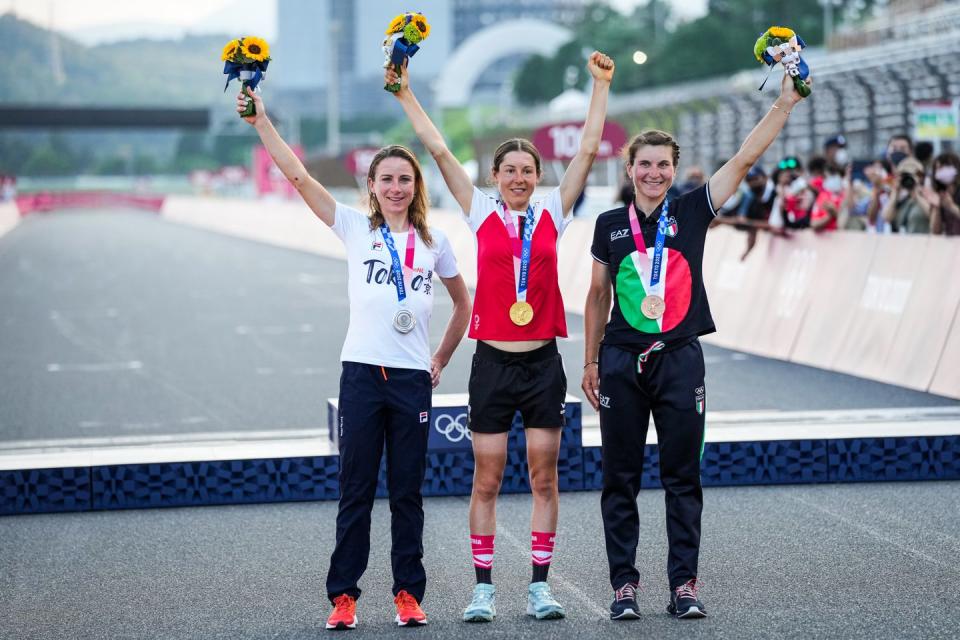
The women’s road race was won by a surprise cyclist—so much of a surprise that other cyclists didn’t know she had won when they crossed the finish line.
Austria’s Anna Kiesenhofer was part of an early breakaway, but she successfully opened a gap on that group—unbeknownst to the riders in the peloton—raced the final 40km alone, and won the race by over a minute. Without race radio or the typical cycling teams, miscommunications like this aren’t entirely surprising.
The Netherlands’s Annemiek van Vleuten won silver, and Italy’s Elisa Longo Borghini took bronze.
“I thought I had won. I’m gutted about this, of course,” van Vleuten told Olympics.com. “At first I felt really stupid, but then the others [her teammates] also did not know who had won.”
The 85-mile race ran from Musashinonomori Park to the Fuji International Speedway and climbed 2,692 meters in blistering heat.
The early breakaway was a five-woman group formed by Kiesenhofer, South Africa’s Carla Oberholzer, Namibia’s Vera Looser, Poland’s Anna Plichta, and Israel’s Omer Shapira. They were chased by Ethopia’s Selam Amha and Eritrea’s Mosana Debesay.
At one point, the gap grew to nearly 10 minutes. Oberholzer and Looser dropped back as the race wore on, and other small groups formed to chase in earnest with less than 50 miles of racing left. Van Vleuten suffered a small crash with a rider from Denmark, and fellow Dutch rider Marianne Vos, one of the race favorites, worked to bring her back up to the peloton.
Riders also began to fall off the back of the peloton as the pace increased on the long climb with around 35 miles to the finish. Dutch racer Demi Vollering attacked up the road, forcing the peloton to painfully speed up as American riders worked to close the gap. Van Vleuten followed Vollering’s lead and attacked immediately after the gap closed.
Van Vleuten’s gap built to over a minute before the peloton began to close it down. But in the front of the race, with around 25 miles to go, Kiesenhofer grew her gap, now leading the race solo.
As van Vleuten was caught by the peloton, the Dutch riders in the front began to relax the pace slightly as Kiesenhofer grew her solo lead. With six miles to go, Kiesenhofer’s gap was 2:36 to the chasers and 3:52 to the peloton, with the gap decreasing as she made a monumental effort to keep the pace up.
Plichta and Shapira were caught by the peloton with less than three miles to the finish, but some riders in the whittled-down peloton didn’t seem to realize that Kiesenhofer was still solo off the front.
“I was happy I could get in front. That is something I could not take for granted because I am not good at riding in the peloton,” Kiesenhofer told Olympics.com.
Her pained face for the final miles made it clear just how hard she was working to maintain that lead.
As Kiesenhofer crossed the line, even she was amazed. “It feels incredible. I couldn’t believe it. Even when I crossed the line, it was like, ‘Is it done now? Do I have to continue riding?’ Incredible,” she added.
Behind her, van Vleuten came in for silver after a successful attack in the final mile. She was followed by Longho-Borghini, with Lotte Kopecky of Belgium in fourth and Vos in fifth. For the Americans, Coryn Rivera finished in seventh, Leah Thomas in 29th and Chloe Dygert in 31st.
One final note: Shout out to Team Canada for these amazing jean jackets as part of their official uniform.
Men’s road race—July 24
🥇 Richard Carapaz, Ecuador
🥈 Wout van Aert, Belgium
🥉 Tadej Pogačar, Slovenia
The men’s road race was a long affair that started at Musashinonomori Park on Saturday morning in Tokyo—Friday night for the North American fans. As the first cycling event of the Olympics, it did not disappoint; this race, which was just under 150 miles of racing and over 4,800 meters of climbing, featured searing hot temperatures and plenty of early breakaways, and we saw just how tired some of the top riders were from their recent efforts at the Tour de France.
The early break with five riders extended their gap to nearly 15 minutes before the peloton began to chase in earnest, with Belgium leading the charge. Belgian Wout van Aert was one of the race favorites, so the squad needed to keep him in good position. The bulk of the climbing would come late in the race, so the racers were playing a tactical game, saving energy and staying as cool as possible in the early miles.
At just under halfway, the gap was coming down as the climbs began, and a small crash left Great Britain’s Geraint Thomas in trouble but still pedaling. With 50 miles left of racing, the break dropped to under five minutes, and with just under 25 miles to go, the peloton swallowed the early chasers, with the Belgian riders controlling the pace.
Then, the attacks began. Tour de France champion Tadej Pogačar attacked, with American Brandon McNulty working to close the gap and Canada’s Mike Woods hot on his heels. When Woods led after a summit. van Aert managed to catch him, but Ecuador's Richard Carapaz and McNulty attacked again, opening a gap with 23 kilometers to go. Woods tried to close the gap, but it was van Aert who eventually had to begin to drive the pace of the whittled down chase group.
With four miles to go, Carapaz—the 2019 Giro d’Italia winner and third-place finisher at this year’s Tour de France—attacked McNulty and sped towards the finish. McNulty struggled to maintain a gap ahead of the chasers, and he was caught with roughly three miles to go.
Carapaz soloed smoothly into the finish to collect the first cycling gold medal of the Tokyo Olympics by more than a minute. Behind him, van Aert managed to sprint for silver in a photo finish, with Pogačar taking the bronze medal. Behind them, Bauke Mollema of The Netherlands scored fourth, Woods in fifth and McNulty in sixth in an impressive performance for the 23-year-old.
You Might Also Like

